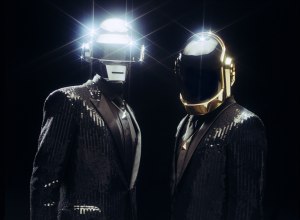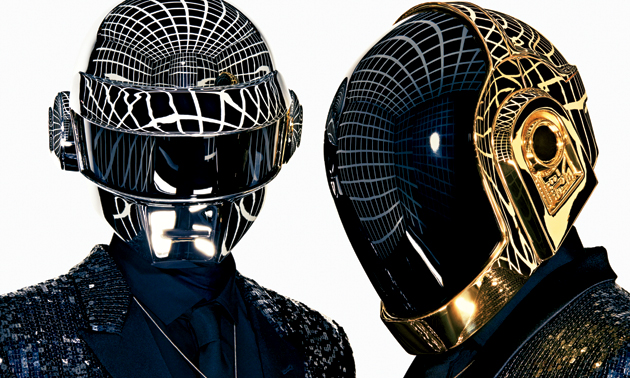 Isn’t it strange how once we forget to mock something it comes back and starts becoming cool again? A few years back, Journey became trendy again. In Fargo Rock City, mop-haired journalist Chuck Klosterman tried to make hair metal cool again. And now’s the latest and cruelest turn: Daft Punk and disco culture.
Isn’t it strange how once we forget to mock something it comes back and starts becoming cool again? A few years back, Journey became trendy again. In Fargo Rock City, mop-haired journalist Chuck Klosterman tried to make hair metal cool again. And now’s the latest and cruelest turn: Daft Punk and disco culture.
The latest album by the giants of Electronic Dance Music is a strictly analogue album: cheesy keyboard, chunky guitars and live drums dominate this record. Gone are the hard edges of Human After All or the heavy sampling of Discovery, let alone the sense of experimentation on Homework.
This could’ve been an interesting change for Daft Punk, but it doesn’t work. Where their last full-length was pointed in criticism (Television Rules the Nation as one very on-the-nose example), this album is relaxed to the extreme. It has nothing to say, so it’ll let Giorgio Moroder ramble for a track. The first time that song came up, I thought I’d accidentally flipped to This American Life for a moment. That’s a bad sign for a dance record.
The problems with Random Access Memories start right with the first single, “Get Lucky”. Gone is anything recognizable of Daft Punk’s sound: there’s a soft funk guitar, courtesy Nile Rogers (guess they saw that documentary too), live drums and Pharrell Williams singing “we’ve gone too far to give up who we are.” The irony’s delicious, folks.
Elsewhere on the album, they drift between boring and dull. “Giorgio By Moroder”, the track mentioned earlier, sounds like a radio documentary. Nothing here sounds like anything you’d want to dance to: “Lose Yourself To Dance” is soulless funk, Within is a piano ballad with computerized vocals and “Touch” is an eight minute track with diarrhea of the keyboards.
The lone time they approach their usual sound is “Contact”, the last song on the album. It’s a tantalizing taste of what could’ve been: the Tron soundtrack arranged for a quintet, the transformation of Daft Punk’s computerized music to a full band pushing out dance music. It’s frustrating, since it shows Daft Punk was capable of so much more than this lifeless 70’s nostalgia-fest.
.
At my most generous, I’d call Random Access Memories a chill-out album, something to listen to at 3 a.m. after a night out. Even then, the best case is it lulls you to sleep. Only once, at the very end of the album, does it ever grab the listener and demand to be heard. Coming from the same act who did Human After All, which just oozes energy, this change in pace is shocking. They’ve gone from Discovery to just plain ol’ disco.
Back in the day, people used to wear “Disco Sucks” shirts. That feeling was strong enough to power bands, record labels and even riots. Remember, disco was more than just dance music. It was a banal middlebrow culture of excess. It was wearing flashy suits, doing cocaine in the bathrooms and showing off those fancy gold chains you just bought. There’s a reason why punk rock sprung up in its wake: it was a culture of bullshit from people obsessed with their image.
 So, it’s telling that Daft Punk have a new look for this album: flashy, expensive suits, custom designed and sparkling. It’s pomp and excess, the look of a band obsessed with image and presentation. It’s the natural extension for Daft Punk, whose Alive 2007 shows were all strobe lights and elaborate sets. Hell, their movie was so obsessed with looking good it was borderline unwatchable.
So, it’s telling that Daft Punk have a new look for this album: flashy, expensive suits, custom designed and sparkling. It’s pomp and excess, the look of a band obsessed with image and presentation. It’s the natural extension for Daft Punk, whose Alive 2007 shows were all strobe lights and elaborate sets. Hell, their movie was so obsessed with looking good it was borderline unwatchable.
At the end of the day, they’re two men in a DJ booth. It’s hard to make that visually appealing without resorting to costumes. Just look at what Deadmaus has to do in order to stand out visually. Hence the robot helmets and the designer suits. Their devotion to looking good and paying tribute to disco – a culture of looking good – has resulted in an album packed with guest appearances, a flashy and memorable ad campaign and music that’s lacking in anything interesting. Random Access Memories is all flash and no sizzle. It’s too bad: this was an exciting band, once.


